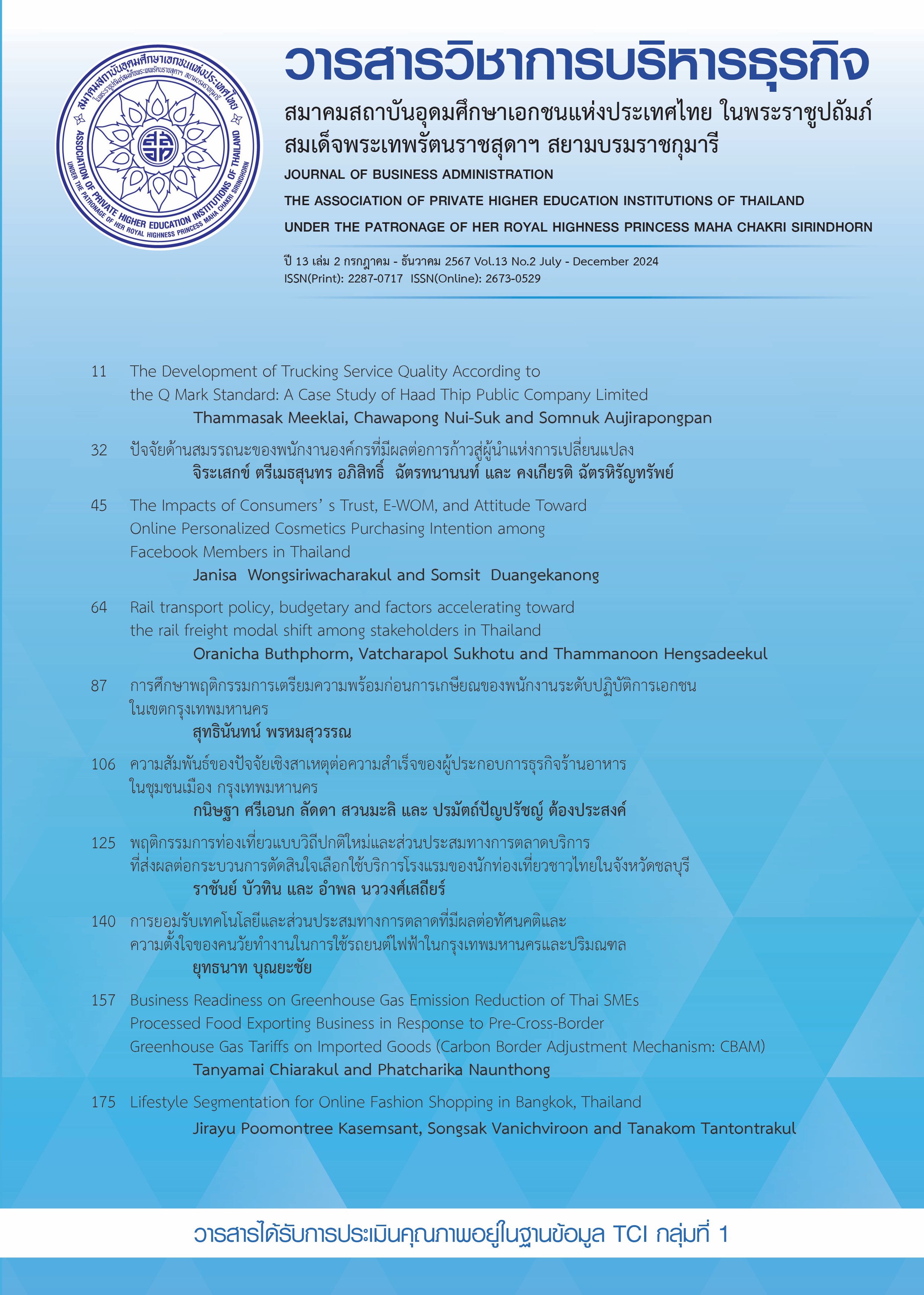การยอมรับเทคโนโลยีและส่วนประสมทางการตลาดที่มีผลต่อทัศนคติและความตั้งใจของคนวัยทำงานในการใช้รถยนต์ไฟฟ้าในกรุงเทพมหานครและปริมณฑล
คำสำคัญ:
การยอมรับเทคโนโลยี , ส่วนประสมทางการตลาด , ทัศนคติ, ความตั้งใจ , คนวัยทำงานบทคัดย่อ
การศึกษานี้มีวัตถุประสงค์ 1) เพื่อศึกษาระดับความคิดเห็นการยอมรับเทคโนโลยีของคนวัยทำงานในการใช้รถยนต์ไฟฟ้าในกรุงเทพมหานครและปริมณฑล 2) เพื่อศึกษาระดับความคิดเห็นส่วนประสมทางการตลาดของคนวัยทำงานในการใช้รถยนต์ไฟฟ้าในกรุงเทพมหานครและปริมณฑล และ 3) เพื่อทดสอบโมเดลสมการโครงสร้างการยอมรับเทคโนโลยีและส่วนประสมทางการตลาดที่มีผลต่อทัศนคติและความตั้งใจของคนวัยทำงานในการใช้รถยนต์ไฟฟ้าในกรุงเทพมหานครและปริมณฑล ประชากรในการวิจัย คือ คนวัยทำงานที่มีรถยนต์ส่วนตัวในกรุงเทพมหานครและปริมณฑล อายุระหว่าง 18-60 ปี โดยเก็บข้อมูลจากกลุ่มตัวอย่าง จำนวน 400 คน เครื่องมือที่ใช้ในการเก็บรวบรวมข้อมูล คือ แบบสอบถาม การวิเคราะห์ข้อมูลโดยหาค่าร้อยละ ค่าเฉลี่ย ส่วนเบี่ยงเบนมาตรฐาน และใช้เทคนิคการวิเคราะห์โมเดลสมการโครงสร้าง ผลการศึกษาพบว่า 1) ระดับความคิดเห็นเกี่ยวกับการยอมรับเทคโนโลยีในภาพรวมของคนวัยทำงานในภาพรวมอยู่ระดับมาก (=3.91, SD=0.77) 2) ระดับความคิดเห็นเกี่ยวกับส่วนประสมทางการตลาดในภาพรวมของคนวัยทำงานในภาพรวมอยู่ระดับมาก (= 4.03, SD=0.80) และ 3) การยอมรับเทคโนโลยีด้านการรับรู้ว่าง่ายในการใช้งาน ด้านการรับรู้ว่ามีประโยชน์ และส่วนประสมทางการตลาดมีผลกระทบทางตรงเชิงบวกต่อทัศนคติที่มีต่อการใช้งาน และมีอิทธิพลทางอ้อมต่อความตั้งใจที่จะใช้งานรถยนต์ไฟฟ้าของประชาชน โมเดลมีความสอดคล้องกลมกลืนกับข้อมูลเชิงประจักษ์ โดยที่ค่า Chi-square/df=1.159, GFI=0.950, CFI=0.995, RMSEA=0.20. ผลของการวิจัยสามารถนำไปเป็นแนวทางในการพัฒนากลยุทธ์กับธุรกิจรถยนต์ไฟฟ้าให้มีความสอดคล้องกับความต้องการใช้งานรถยนต์ไฟฟ้าของผู้บริโภคอย่างมีประสิทธิภาพและประสิทธิผล
เอกสารอ้างอิง
Agarwal, R., & Prasad, J. (1999). Are Individual Differences Germane to the Acceptance of New Information Technologies? A Journal of the Decision Science Institute, 30(2), 361-391.
Ajzen, I. (1991). The Theory of Planned Behavior. Organizational Behavior and Human Decision Processes, 50(2), 179-212.
Byrne, B. M. (2013). Structural equation modeling with EQS: Basic concepts, applications, and programming. Routledge.
Cochran, W. G. (1953). Sampling Techniques. John Wiley & Sons, Inc.
Davis, F. (1989). Perceived Usefulness, Perceived Ease of Use, and User Acceptance of Information Technology. MIS Quarterly, 13(3), 319-340.
Dinudom, W. (2019). The Acceptance of Technology and the Intention to use Electric Vehicles in the Bangkok Metropolitan Region in Thailand [Master’s thesis, Thammasat University]. https://digital.library.tu.ac.th/tu_dc/frontend/Info/item/dc:175976 [in Thai]
Hair, J. F., Black, W. C., Babin, B. J., & Anderson, R. E. (2010). Multivariate Data Analysis. (7thed.). Pearson.
Hair, J. F., Risher, J. J., Sarstedt, M., & Ringle, C. M. (2019). When to Use and How to Report the Results of PLS-SEM. European Business Review, 31(1), 2-24.
Huang, X., & Ge, J. (2019). Electric Vehicle Development in Beijing: An Analysis of Consumer Purchase Intention. Journal of Cleaner Production, 216, 361-372.
Inthurit, D. (2022). Factors effecting toward purchase the battery electric vehicle [Master ‘s Dissertation, Rajamangala University of Technology Tawan-ok.]. https://arit.rmutto.ac.th/e-book/admin/book_file/100bookfile.pdf [in Thai]
Jindarasamee, S. (2022, October 5). A Beam Consulting Reveals the Trend of the Electric Car Market in Thailand is growing. https://www.grandprix.co.th/abeam-ev/ [in Thai]
Kline, R. B. (2016). Principle and Practice of Structure Equation Modeling. (4th ed.). The Guilford Press.
Kuntawong, P., Suwannoi, T., Sukhaparamate, S., Jantarakolica, K., & Jantarakolica, T. (2022). Policy Factors Affecting the Decision Making to Use Vehicles in Thailand. Thammasat Business Journal, 45(74), 79-110. [in Thai]
Kotler, P., & Kelle, K. L. (2021). Marketing Management Global Edition. Pearson.
Krishnan, V. V., & Koshy, B. I. (2021). Evaluating the factors influencing purchase intension of electric vehicles in households owning conventional vehicles. Case Studies on Transport Policy, 9(3), 1122-1129.
Laeieddeenun, K. (2018). Technology Acceptance and Online Consumer Behavior Affecting E-Books’ Purchase Decisions of Customers in Bangkok [Master’s thesis, Bangkok University]. http://dspace.bu.ac.th/jspui/handle/123456789/1883 [in Thai]
Nimitvanich, M., & Tongsuar, V. (2023, October 5). A New Alternative Market for Thai Cars. https://krungthai.com EconomyResourcesDownload_18723_11_65.pdf [in Thai]
de Oliveira, M. B., da Silva, H. M. R., Jugend, D., Fiorini, P. D. C., & Paro, C. E. (2022). Factors influencing the intention to use electric cars in Brazil. Transportation Research Part A: Policy and Practice, 155, 418-433.
Pankla, S., & Keawpromman, C. (2020). Factor Affecting to Consumers’ Purchasing Plug-in Hybrid Electric Vehicle of Consumer in Bangkok Metropolitan. Journal of the Association of Researchers, 25(2), 117-132. [in Thai]
Rajesh, D., & Rajasulochana, D. M. (2022). A study on factors influencing the purchase of electric vehicles in Indian auto mobile market. Journal of Contemporary Issues in Business and Government, 28(4), 968-979.
Sektawelarp, P. (2017). Factors Affecting Behavioral Intention to Use Cloud Storage at the Software-as-a-Service (SaaS) Level of Employees of Private Organizations in Economic areas. of Bangkok [Master’s thesis, Bangkok University] http://dspace.bu.ac.th/jspui/handle/123456789/1261 [in Thai]
Schumacker, R. E., & Lomax, R. G. (2016). A Beginner’s Guide to Structural Equation Modeling (4th ed.). Routledge.
Songtanawong, S. (2021). Factors Influencing the Intension to Purchase Electric Vehicles in Chonburi [Master’s thesis, Burapha University]. http://ir.buu.ac.th/dspace/handle/1513/473 [in Thai]
Thanacharoenphisan, E. (2011). Awareness and Acceptance of the Use of Environmental Management Systems. (ISO 14001) for Use in Government Organizations: A Case Study of the Office of Natural Resources Policy and Planning and Environment [Master's thesis, National Institute of Development Administration]. http://repository.nida.ac.th/handle/662723737/2048 [in Thai]
Tokham, P, Tanichkul, V., & Anywatnapong, M. (2022). The Influence of Factors on Purchasing Decision Process for Battery Electric Vehicles of Consumers in Metropolis. Journal of Business Administration and Social Sciences Ramkhamhaeng University, 5(1), 53-72. [in Thai]
Tu, J. C., & Yang, C. (2019). Key factors influencing consumers’ purchase of electric vehicles. Sustainability, 11(14), 3863.
Yantarapakorn, R. (2019). Factors Influencing Consumer Intentions to Adopt Connected Smart Cars [Master’s thesis, Thammasat University]. https://ethesisarchive.library.tu.ac.th/thesis/2019/TU_2019_6123030170_11156_12108.pdf [in Thai]
Yuwadeeniwat, N., Pathomsirikul, Y., & Sriwanat. A. (2019). A Model of the Marketing Strategies Influencing the Decision to Purchase Eco Cars in Thailand. Journal of Economics and Management Strategy, 6(1), 77-90. [in Thai]

ดาวน์โหลด
เผยแพร่แล้ว
รูปแบบการอ้างอิง
ฉบับ
ประเภทบทความ
สัญญาอนุญาต
ลิขสิทธิ์ (c) 2024 วารสารวิชาการบริหารธุรกิจ สมาคมสถาบันอุดมศึกษาเอกชนแห่งประเทศไทย

อนุญาตภายใต้เงื่อนไข Creative Commons Attribution-NonCommercial-NoDerivatives 4.0 International License.
บทความที่ลงตีพิมพ์ในวารสารวิชาการบริหารธุรกิจ สมาคมสถาบันอุดมศึกษาเอกชนแห่งประเทศไทยต้องเป็นบทความที่ไม่เคยได้รับการตีพิมพ์เผยแพร่ หรืออยู่ระหว่างการพิจารณาตีพิมพ์ในวารสารอื่นๆ การละเมิดลิขสิทธิ์เป็นความรับผิดชอบของผู้ส่งบทความโดยตรง

